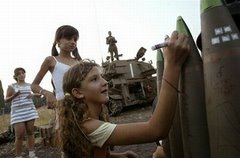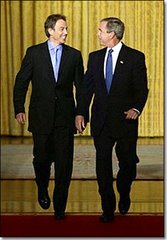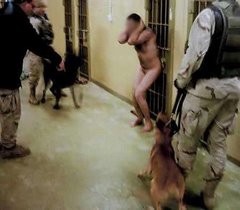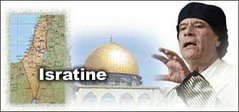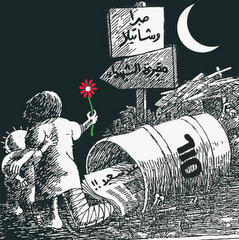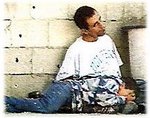
Sameer Alqantar free from prison
Five Lebanese prisoners have been handed over to the Hezbollah movement by Israel, as part of a swap for the bodies of two Israeli soldiers.
The freed men arrived to a heroes' welcome at the Naqoura border crossing on Wednesday, just hours after Israel received coffins containing the remains of Ehud Goldwasser and Eldad Regev, two Israeli army reservists captured in 2006.
The prisoners released were Samir Kuntar, who was jailed for three murders in Israel in 1979, and four men captured during the 34-day war sparked by the capture of Goldwasser and Regev.
They were the last remaining Lebanese in Israeli custody.
Hezbollah also received the bodies of almost 200 people, including the body of Dalal al-Maghrebi, a female fighter with the Palestinian Fatah movement.
Cheering supporters
The prisoners were brought across the border in a convoy of four International Committee of the Red Cross vehicles before changing in military fatigues to greet crowds of well-wishers.
Kuntar wiped away tears as he stood in front of the cheering crowd.
"We knew that you were waiting for the resistance and it reached you. You came back free and heroes," Ibrahim Amin al-Sayed, head of Hezbollah's political bureau, said.
The five men then boarded Lebanese army helicopters for a flight to Beirut, to be received by the country's president, prime minister and other officials.
"Your return is a new victory and the future with you will only be a shinning march in which we achieve the sovereignty of our land and the freedom of people," Michel Sleiman, the president, said at the airport.
"I tell Samir and his companions that they have a right to be proud of their country, their army and their resistance."
In south Beirut, tens of thousands of people, many of them waving Hezbollah's green and yellow flag, waited for the men to arrive at a huge rally during which Hassan Nasrallah, the group's leader, was expected to speak.
Hezbollah named the exchange "Operation Radwan", in honour of Imad Moughniyah, known as "Hajj Radwan", the group's military commander who was assassinated in Syria in February.
Israelis sombre
In contrast to the upbeat mood in Lebanon, the scene across the border in Israel was sombre.
At the family home of reservist Regev, a crowd of about 50 mourners gathered and his family wept, seeing their son's coffin displayed on television for the first time.
"It was hard to see one coffin being lowered to the ground and then another one. It was awful to see it. I asked them to turn off the television because I didn't want to see it," Regev's father Zvi told public radio.
"We always hoped that Eldad and Udi would return home alive and that we would be able to hug them."
Before the exchange there had been speculation that at least one of the Israeli soldiers had been alive, but Hezbollah TV confirmed that both were dead.
"The Lebanese people sacrificed almost 800 soldiers, its entire economy," he said. "For what? For the killer of a three-year-old girl? Is that a hero? For me he is nothing more than a little bigot."
'Difficult decision'
Miri Eisin, a former aide to Ehud Olmert, the Israeli prime minister, said Israel found the release of Kuntar an "incredibly difficult decision".
"Today in Israel we are mainly reflecting on the price we pay in our country to defend our borders," she told Al Jazeera.
David Chater, Al Jazeera's correspondent in Rosh Hanikra on the Israeli side of the border, said that the Israeli cabinet had "agonised" over the exchange.
"[They] voted in favour of it against the advice of the Israeli intelligence service ... which thinks it will only encourage kidnappings," he said. "But the bulk of Israeli public opinion is behind this deal".
Robert Fisk, a Middle East expert and journalist with the Independent newspaper, told Al Jazeera: "It's regarded as being the final chapter of the 2006 war."
"The Israelis certainly lost that war, they did not get their prisoners back - not until now and they're getting them back dead. So more than 1,000 Lebanese civilians and more than 160 Israelis, most of them soldiers, all died for absolutely nothing and that's what today's prisoner exchanges prove."
Lebanon has declared a national holiday to celebrate the prisoner swap.
"This is a big day because it's the day we [Lebanon] have the liberation of four or five heroes," Wassim Manssouri, a professor in constitutional law at Beirut's Lebanese University, told Al Jazeera from the capital.
Palestinian reaction
Celebrations were also under way in Ramallah, in the occupied West Bank.
"The exchange is seen as a victory for Arab resistance," Nour Odeh, Al Jazeera's correspondent, in the West Bank, said.
Kuntar is a member of Lebanon's Druze population.
Walid Jumblatt, Lebanon's Druze leader, told Al Jazeera: "My father was the founder of a Lebanese-Palestinian coalition to fight Israel and recover the Palestinians' rights. My father would be happy."
"I am happy [too], but we should not forget the Palestinians who are detained in their own land," he said.
The Hezbollah exchange has prompted the public in Arab countries such as Jordan and Egypt - which have both signed peace deals with Israel - to question why their governments have not been able to repatriate the bodies of their soldiers.
Posted By Aljazeer.net




